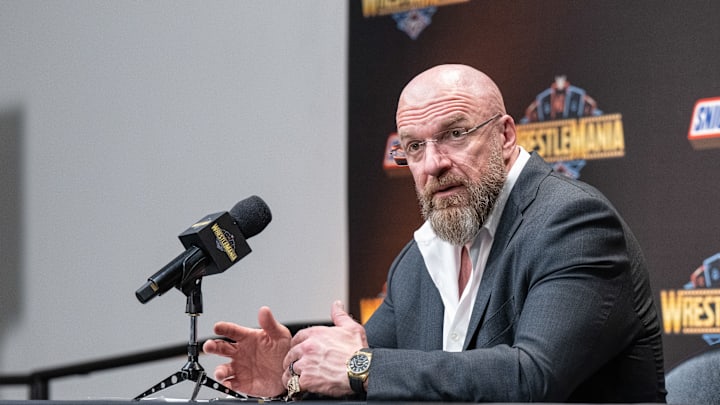WrestleMania 41 failed to deliver the punch WWE fans expected from its biggest event of the year. While the two-night spectacle still drew eyes and headlines, the creative execution of a historic heel turn to orchestrate the main event and an undercard lacking emotion left many underwhelmed.
With the so-called honeymoon period for Triple H’s creative leadership winding down, if not already over, the pressure is mounting to steer WWE’s direction back on course.
A Main Event Without a Heart
In 2024, at WrestleMania 40, WWE paid off the years-long storyline of Cody Rhodes "finishing his story," while intertwining it with a major turning point in the Bloodline saga—two narratives the company executed nearly perfectly, beat for beat. But stories end, and new ones must begin. Since then, WWE has been tasked with building fresh programming which, while strong in spurts, hasn’t reached the same high bar set by the lead-up to WrestleMania 40.
That narrative became crystal clear when Rhodes and the freshly heeled John Cena stumbled through a bumpy ride en route to their main event clash at the Grandest Stage of Them All. It seemed destined to be a landmark headliner—a moment in time for fans who grew up with the Face That Runs the Place now playing the bad guy against WWE’s new top dog. Instead, it landed with a thud.
The catalyst of the feud, The Rock, was nowhere to be seen—not even mentioned by name. Fans spent weeks searching for clues, wondering which show he might appear on, waiting for the moment he’d return to fill the storyline’s glaring plothole. Instead, somehow, it all pivoted to Travis Scott interfering and getting his receipt—an action that, apparently, was enough to distract Rhodes into losing his title.
It lacked creativity, emotional weight, and the kind of storytelling that makes a WrestleMania moment feel timeless—something shockingly absent from Triple H’s booking this season.
Undercard in Crisis
That lack of emotion carried over into an underwhelming undercard. Sure, losing Kevin Owens vs. Randy Orton was a brutal blow—especially with months of backstory behind it—but that doesn’t excuse waiting until the week of WrestleMania to load up the card with matches that had next to no build. Fans had little reason to invest in either tag team title match, which somehow didn’t include the TLC bout between The Street Profits, Motor City Machine Guns, and DIY. And AJ Styles vs. Logan Paul? A lackluster match that never had much substance to begin with.
This even extended to the world title matches involving the Royal Rumble winners—bouts that may not have technically been part of the undercard but still felt like lower-tier affairs. Jey Uso and Gunther delivered a matchup fans had already seen several times, while Charlotte Flair and Tiffany Stratton never managed to find chemistry, either in the ring or in their buildup. It was just more evidence of things missing the mark creatively.
The Bright Spots Couldn’t Save It
The two-night affair certainly had its bright spots. CM Punk, Roman Reigns, and Seth Rollins delivered everything you'd expect from a WrestleMania main event on Night 1—high-level wrestling, compelling drama, and a twist that left fans eager for what’s next. Iyo Sky, Rhea Ripley, and Bianca Belair followed with a spectacular showing to open Night 2. Coming off a strong Saturday and a thrilling Sunday opener, fans had every reason to feel optimistic—especially with Dominik Mysterio scoring a surprisingly fun title win shortly afterward.
But even though those moments stood out, they all happened before the main event on Night 2. And in a “what have you done for me lately” world, they didn’t resonate as strongly once both nights were defined by unimaginative storytelling—in a business built on stories. The result was a series of forgettable matches and a main event that landed with a thud, falling far short of the emotion, hype, and narrative weight promised by Cena’s shocking heel turn.
Where Triple H Goes From Here
WrestleMania 41 wasn’t a disaster—but it wasn’t the creative high point many had hoped for either. Coming off the emotional payoff of WrestleMania 40, this year’s event felt more like a reset than a culmination. And maybe that’s exactly what WWE needs.
The good news? Triple H and the creative team wasted no time moving forward. The Raw after WrestleMania signaled a clear shift: Randy Orton reignited a nostalgic rivalry with Cena, NXT standouts were introduced in fun and refreshing ways, and both Rollins and Becky Lynch turned heel—opening the door for fresh dynamics and long-term storytelling. It felt less like a follow-up and more like the first page of a new season.
Now is the time to turn that page completely. WrestleMania 41 may not have delivered the magic fans expected, but it created space for a creative refresh WWE desperately needs. With new talent emerging, characters evolving, and stories just beginning to unfold, the pressure is still on—but so is the opportunity.
Triple H has a chance to prove that the vision fans believed in isn’t fading—it’s just getting started.
